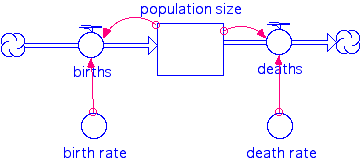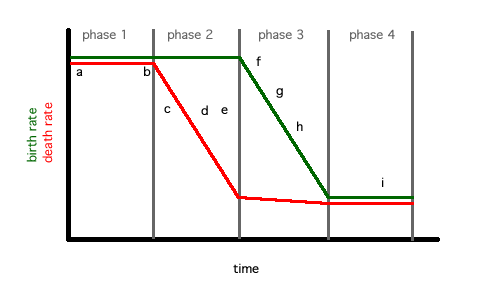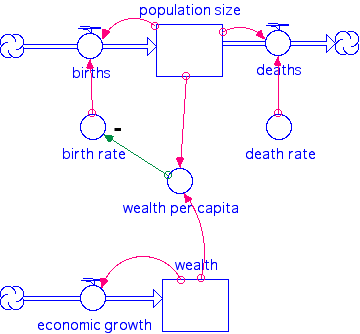Demographic Transition Model
1. Resource limitation
models are unrealistic for human population growth
review "Logisitic model"
r and K parameters
resource depletion models
resource --> population
2. Human population
model
birth and death rates explicitly
(not net growth rate)
"systems model"
of this

factors that control these
resource level
social and technological infrastructure
human choices for their
own future
3. Demographic transition
model
describes how people in industrial
societies decided to have fewer children
important question
- does this model help predict what will happen
four stages of the demo trans
1. preindustrial
2. infrastructure improvements
- mortality transition
3. humans choose to have
smaller families - fertility transition
4. post-industrial

sketch the net growth rate
and population size
4. Many of the factors
that contribute to this decision are economic
when people have more economic
stability, they reduce their family size
linking human growth rate
to economic growth rate
if population grows faster
than economy then per captia wealth decreases
if economy grows faster than
population then per capita wealth increases

wealth per capita seems to
be a major factor in fertililty decisions
suggested reasons for the
fertiility transition
- availability of family planning (birth control)
- delay first birth until later years
- women gain access to education
- women gain access to jobs and economic
- women gain political rights and higher social status
- government incentives for having smaller families (or penalties for
larger families)
- decreased utility of having many children in a agricultural economy
- increased value placed on supporting and educating children so that
they can work in the industrial economy
correlations are not necessarily
causes
5. Humans choose to control their population
individuals make decisions
for their own personal good
combination of factors
make that a good social transition
i.e. they don't consciously
try to force the demo trans
6. Poverty "traps"
general definition of an
environmental trap
by the time you get into
it, you have a hard time getting out
a "trap" is not
a "dead end", you don't just turn around
often traps
slow processes build
up
behaviors/mechanism that
got you in won't get you out
require a shift (technology,
behavior, culture)
|
![]()